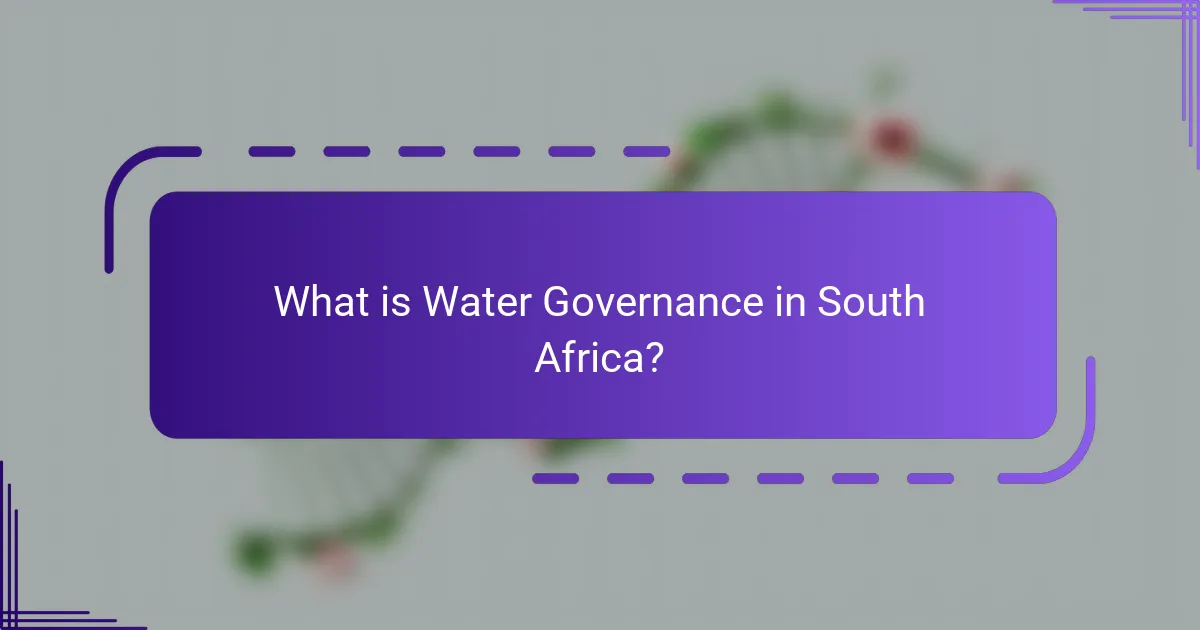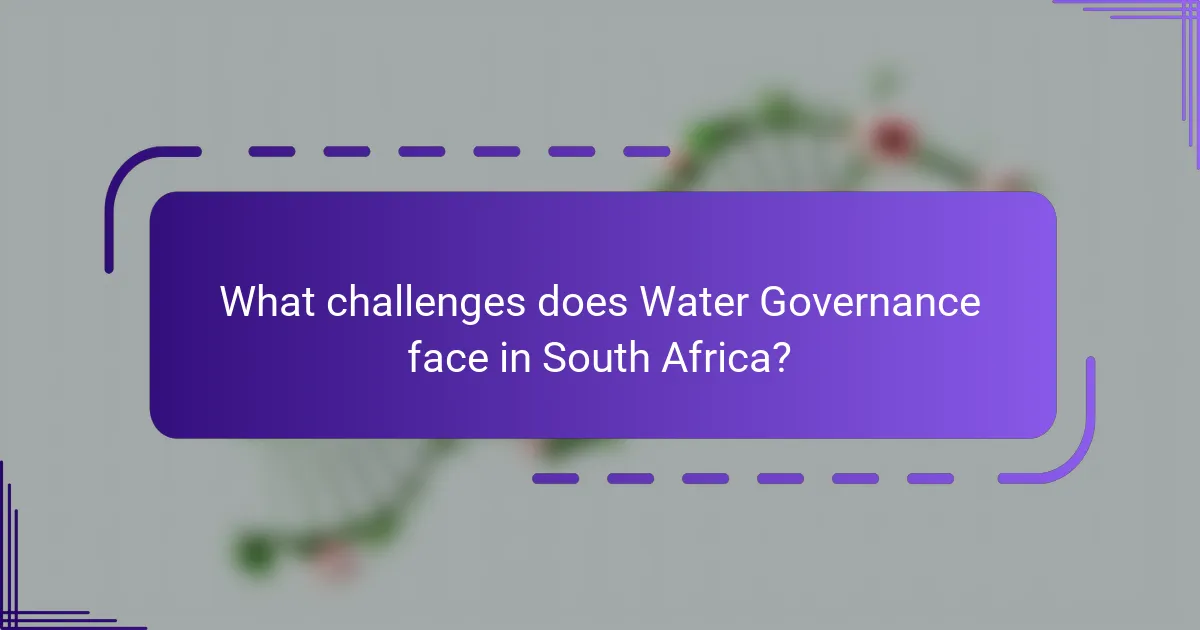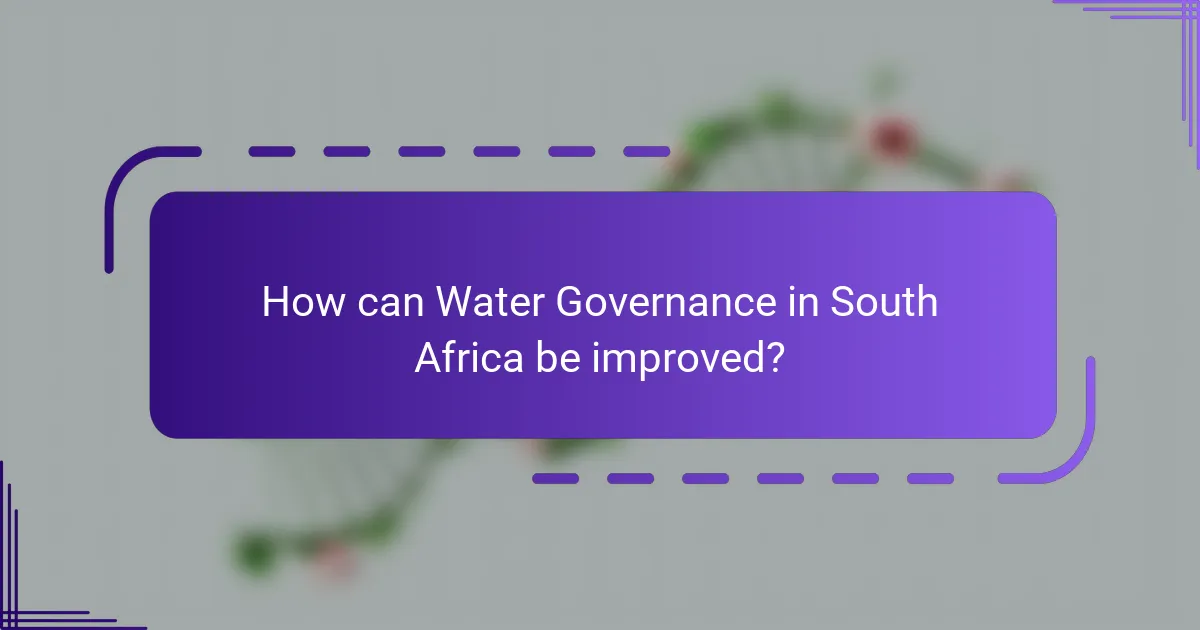Water governance in South Africa involves the management of water resources through policies, regulations, and practices overseen by the Department of Water and Sanitation. Key stakeholders in this governance framework include government entities, local communities, and the private sector. The article addresses significant challenges such as water scarcity, pollution, inadequate infrastructure, and socioeconomic disparities that hinder equitable access to water. It outlines the importance of improving stakeholder collaboration, enhancing regulatory frameworks, and increasing investment in infrastructure to ensure sustainable water use and protect resources for future generations. Additionally, the role of technology and public awareness in optimizing water management is emphasized.

What is Water Governance in South Africa?
Water governance in South Africa refers to the processes and institutions that manage water resources. It encompasses the policies, regulations, and practices that govern water supply and quality. The government, through the Department of Water and Sanitation, oversees water management. Various stakeholders, including local communities and private sectors, are involved in decision-making. South Africa faces significant challenges such as water scarcity and pollution. The National Water Act of 1998 established a framework for equitable water distribution. Effective governance aims to ensure sustainable water use and protect resources for future generations.
Why is Water Governance important in South Africa?
Water governance is crucial in South Africa due to the country’s limited water resources and high demand. Effective governance ensures equitable access to water for all citizens. It plays a vital role in managing water quality and sustainability. South Africa faces significant challenges like droughts and pollution. Proper governance frameworks help mitigate these issues. The National Water Act of 1998 emphasizes sustainable management. This act promotes the protection of water resources for future generations. Additionally, inclusive governance fosters community involvement in water management decisions.
How does Water Governance impact communities in South Africa?
Water governance significantly impacts communities in South Africa by influencing access to clean water. Effective governance ensures equitable distribution of water resources among communities. It also fosters community participation in water management decisions. Poor governance can lead to water scarcity and conflict over resources. Communities often face challenges such as inadequate infrastructure and mismanagement. The South African Constitution guarantees the right to access sufficient water. However, disparities exist, particularly in rural areas. Studies indicate that over 14 million South Africans lack access to safe drinking water. These factors highlight the crucial role of governance in shaping water security for communities.
What are the historical contexts influencing Water Governance in South Africa?
Water governance in South Africa is influenced by historical contexts such as colonialism, apartheid, and post-apartheid policies. Colonialism established unequal access to water resources. This set a precedent for racial and economic disparities in water distribution. Apartheid further entrenched these inequalities, prioritizing white populations in water access and infrastructure. The post-apartheid era aimed to address these injustices through the National Water Act of 1998. This act sought to promote equitable access and sustainable management of water resources. However, challenges remain due to legacy issues and ongoing socio-economic disparities. These historical contexts continue to shape current water governance frameworks and policies.
Who are the key stakeholders in Water Governance in South Africa?
The key stakeholders in water governance in South Africa include government entities, civil society organizations, and private sector participants. Government entities consist of national, provincial, and local authorities responsible for water management. The Department of Water and Sanitation plays a crucial role in policy formulation and regulation. Civil society organizations advocate for community rights and promote sustainable practices. Private sector participants, including water service providers, contribute to infrastructure development and service delivery. These stakeholders collaborate to address water scarcity and ensure equitable access to water resources.
What roles do government agencies play in Water Governance?
Government agencies play crucial roles in water governance by establishing policies, regulations, and frameworks for water management. They are responsible for managing water resources sustainably and ensuring equitable access. Agencies conduct research and monitor water quality and availability. They also enforce compliance with water laws and regulations. Additionally, government bodies facilitate stakeholder engagement and coordination among various sectors. They provide funding and support for water infrastructure projects. These roles are essential for addressing water scarcity and promoting efficient use of water resources.
How do non-governmental organizations contribute to Water Governance?
Non-governmental organizations (NGOs) significantly contribute to water governance by advocating for sustainable water management practices. They engage in community education about water rights and conservation. NGOs often facilitate stakeholder participation in decision-making processes. They provide critical data and research to inform policy development. NGOs also monitor water quality and resource management practices. Their advocacy efforts can influence legislation and regulatory frameworks. Additionally, they often collaborate with government entities to implement water projects. This collaboration helps to enhance transparency and accountability in water governance.
What is the role of local communities in Water Governance?
Local communities play a crucial role in water governance by participating in decision-making processes. They provide valuable local knowledge that enhances water management strategies. Engaging communities fosters transparency and accountability in water resource management. Local involvement ensures that water governance reflects the needs and priorities of the community. According to the South African National Water Act of 1998, public participation is essential in water management. This act emphasizes the importance of involving local stakeholders in the planning and implementation of water policies. Additionally, community-based initiatives can lead to more sustainable water use practices. In essence, local communities are vital for effective and equitable water governance.
What are the main responsibilities of stakeholders in Water Governance?
Stakeholders in water governance have several key responsibilities. They are responsible for ensuring sustainable water management. This includes planning and implementing water policies. Stakeholders must also engage with communities to promote participation. They need to monitor water quality and availability regularly. Additionally, stakeholders are tasked with enforcing regulations and standards. They must collaborate with various sectors to integrate water management. Finally, stakeholders are responsible for addressing conflicts over water resources. These responsibilities are crucial for effective water governance in South Africa.
How do national policies shape stakeholder responsibilities?
National policies establish the framework for stakeholder responsibilities in water governance. They define roles, obligations, and expectations for various stakeholders. For example, the National Water Act of 1998 in South Africa assigns specific duties to government bodies, private entities, and communities. This legislation mandates that stakeholders must collaborate in water resource management. Policies also set regulatory standards that stakeholders must adhere to, ensuring sustainable practices. Additionally, national policies often include accountability measures for non-compliance, reinforcing responsibilities. Through these mechanisms, national policies shape how stakeholders engage with water governance effectively.
What are the specific duties of water management authorities?
Water management authorities are responsible for the regulation and management of water resources. Their specific duties include ensuring the sustainable use of water, protecting water quality, and managing water supply systems. They also oversee the allocation of water rights and enforce compliance with water regulations. Monitoring and assessing water resources is a key duty to inform policy decisions. Authorities engage in public education about water conservation and management practices. They coordinate with various stakeholders, including government agencies and local communities. Furthermore, they develop and implement water management plans to address challenges such as drought and pollution. These responsibilities are vital for maintaining water security and sustainability in South Africa.

What challenges does Water Governance face in South Africa?
Water governance in South Africa faces significant challenges. These include inadequate infrastructure, which hampers efficient water distribution. Poor water quality affects public health and agricultural productivity. Governance issues arise from fragmented institutional frameworks and lack of coordination among stakeholders. Socioeconomic disparities lead to unequal access to water resources. Climate change exacerbates water scarcity, impacting both urban and rural communities. Corruption and mismanagement hinder effective water resource management. Legal and regulatory frameworks often lack enforcement, resulting in violations and unsustainable practices. These challenges collectively threaten the sustainability of water governance in South Africa.
What are the primary challenges affecting Water Governance?
The primary challenges affecting water governance include inadequate infrastructure, regulatory complexity, and resource scarcity. Inadequate infrastructure leads to inefficiencies in water distribution and management. Regulatory complexity creates confusion among stakeholders regarding responsibilities and compliance. Resource scarcity is exacerbated by climate change and population growth, putting pressure on available water supplies. Additionally, poor data management hinders effective decision-making. These challenges often result in conflicts among users and undermine sustainable water management practices.
How does climate change impact water resources in South Africa?
Climate change significantly impacts water resources in South Africa. Increased temperatures lead to higher evaporation rates. This reduces the availability of surface water. Changes in rainfall patterns result in prolonged droughts in some regions. For instance, the Western Cape experienced severe droughts between 2015 and 2018. These conditions strain water supply systems. Additionally, climate change exacerbates water quality issues. Increased runoff from heavy rains can lead to pollution in water bodies. This situation poses challenges for water governance. Effective management is required to adapt to these changing conditions.
What are the socio-economic factors influencing Water Governance?
Socio-economic factors influencing water governance include economic development, social equity, and institutional capacity. Economic development affects the availability of resources for water management. Regions with higher economic growth often invest more in water infrastructure. Social equity ensures that all communities have access to water resources. Inequitable distribution can lead to conflicts and inefficiencies. Institutional capacity relates to the effectiveness of organizations managing water resources. Strong institutions can implement policies that promote sustainable water use. According to the World Bank, effective governance is crucial in managing water resources amid socio-economic disparities.
How do governance structures affect water management?
Governance structures significantly influence water management by determining decision-making processes and resource allocation. Effective governance frameworks promote stakeholder participation and accountability in water management. In South Africa, the National Water Act of 1998 established a governance framework that decentralizes authority to local water management institutions. This decentralization allows for more tailored approaches to local water issues. Research indicates that strong governance structures lead to improved water quality and equitable access to water resources. For instance, the Water Research Commission highlights that effective governance correlates with enhanced community engagement and sustainable water practices. Therefore, governance structures are crucial for ensuring efficient and equitable water management outcomes.
What are the implications of fragmented governance on water distribution?
Fragmented governance negatively impacts water distribution by creating inefficiencies and inconsistencies. Different authorities may have conflicting regulations and priorities. This leads to unequal access to water resources across regions. Communities may experience varying water quality and availability. Coordination between agencies often becomes challenging. As a result, water management can become reactive rather than proactive. Studies show that fragmented governance can exacerbate water scarcity issues. For instance, the South African Department of Water and Sanitation highlights the need for integrated approaches to improve distribution.
How can integrated water resource management improve governance?
Integrated water resource management (IWRM) can improve governance by promoting coordinated planning and management of water resources. IWRM fosters collaboration among various stakeholders, including government, communities, and private sectors. This approach enhances transparency in decision-making processes. It also encourages sustainable water use, which is crucial for long-term governance.
Research shows that IWRM leads to more equitable access to water resources. According to the United Nations, effective IWRM can reduce conflicts over water allocation. Additionally, it supports the implementation of policies that address environmental concerns. Countries that have adopted IWRM report improved water quality and ecosystem health. These benefits collectively strengthen governance structures and enhance public trust in water management systems.

How can Water Governance in South Africa be improved?
Improving water governance in South Africa requires enhancing stakeholder collaboration. Effective communication among government, communities, and private sectors is essential. Implementing integrated water resource management can optimize water usage. Strengthening regulatory frameworks ensures compliance with water policies. Increased investment in infrastructure is necessary to address water scarcity. Promoting public awareness about water conservation can foster responsible usage. Furthermore, utilizing technology for monitoring water resources can improve management efficiency. These measures collectively address the challenges faced in water governance.
What best practices can enhance Water Governance?
Best practices that can enhance water governance include stakeholder engagement, transparency, and integrated management. Stakeholder engagement ensures that all voices are heard, fostering collaboration. Transparency builds trust and accountability among all parties involved. Integrated management promotes a holistic approach, considering social, economic, and environmental factors. Evidence from the United Nations suggests that inclusive governance leads to better water management outcomes. Additionally, the World Bank emphasizes that effective governance frameworks can reduce conflicts over water resources. These practices collectively contribute to sustainable and equitable water governance.
How can stakeholder collaboration be fostered in Water Governance?
Stakeholder collaboration in water governance can be fostered through inclusive dialogue and transparent decision-making processes. Engaging all relevant stakeholders, including government agencies, community groups, and private sector entities, ensures diverse perspectives are considered. Regular consultations and workshops can facilitate communication and build trust among stakeholders. Establishing clear roles and responsibilities for each participant enhances accountability and commitment. Utilizing technology for data sharing and collaboration platforms can streamline information exchange. Evidence shows that successful water governance frameworks, such as those in the Netherlands, prioritize stakeholder engagement, resulting in more effective management and sustainable outcomes.
What role does technology play in improving Water Governance?
Technology plays a crucial role in improving water governance by enhancing data collection and management. Advanced technologies enable real-time monitoring of water quality and availability. Geographic Information Systems (GIS) facilitate spatial analysis for better resource allocation. Mobile applications empower communities to report water issues quickly. Data analytics help in predicting water demand and optimizing supply. Remote sensing technologies provide insights into hydrological changes. These innovations contribute to more informed decision-making processes. A World Bank report highlights that technology adoption can increase efficiency by up to 30% in water management systems.
What practical steps can be taken to address challenges in Water Governance?
Implementing integrated water resource management (IWRM) can address challenges in water governance. IWRM promotes coordinated development and management of water, land, and related resources. Establishing clear legal frameworks is essential for defining roles and responsibilities among stakeholders. Engaging local communities ensures that water management reflects their needs and knowledge. Enhancing data collection improves decision-making and transparency in governance. Capacity building for institutions involved in water governance strengthens their effectiveness. Regular stakeholder consultations foster collaboration and consensus on water-related issues. These steps collectively create a more resilient and equitable water governance system.
How can community engagement be strengthened in water management?
Community engagement in water management can be strengthened through inclusive decision-making processes. Involving local communities in planning and management fosters ownership and accountability. Regular workshops and educational programs enhance awareness of water issues. Utilizing technology for feedback, such as mobile apps, can facilitate communication. Collaborations with local organizations can build trust and networks. Evidence shows that participatory approaches improve project outcomes, as seen in the South African National Water Act, which emphasizes stakeholder involvement.
What policies can be implemented to ensure sustainable water use?
Policies to ensure sustainable water use include integrated water resource management (IWRM). IWRM promotes coordinated development and management of water, land, and related resources. This approach balances social and economic needs while protecting ecosystems. Water pricing policies can also be implemented to encourage conservation. Proper pricing reflects the true cost of water supply and promotes efficient use.
Regulations on water quality and quantity can enforce standards that protect water resources. For example, limits on pollutants help maintain safe drinking water. Incentives for water-saving technologies can encourage businesses and households to reduce consumption. Programs that support rainwater harvesting and greywater reuse also contribute to sustainable practices.
Education and awareness campaigns can inform communities about the importance of water conservation. In South Africa, the National Water Act supports sustainable management of water resources. This act emphasizes equitable access and sustainable use, ensuring that policies align with both human needs and environmental protection.
Water governance in South Africa involves the management processes and institutions that regulate water resources, including policies, regulations, and practices to ensure sustainable use and equitable access. Key stakeholders include government entities, civil society organizations, and local communities, each with specific responsibilities in water management. The article outlines the challenges faced in water governance, such as water scarcity, pollution, and historical disparities, while emphasizing the importance of integrated water resource management and stakeholder collaboration to improve governance outcomes. Additionally, it discusses the role of technology and community engagement in addressing these challenges and ensuring sustainable water practices.